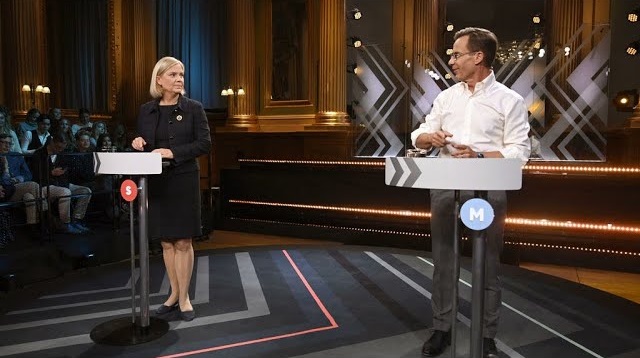Swedish Democrats and anti-immigration supporters cheer during the party’s election night rally in Nacka, near Stockholm – the party looked set to score its best electoral result yet
Stockholm (AFP) – Sweden’s right-wing appeared poised to oust Prime Minister Magdalena Andersson’s left-wing bloc in Sunday’s general election after making strong gains for the far right, clinging to a narrow margin with 94 percent of constituencies counted.
The right-wing bloc won a majority of 176 of the 349 seats in parliament, with the left-wing bloc gaining 173 seats.
As the voting date approaches, electoral authorities said they do not expect a final result until Wednesday when the last votes from abroad and from pre-voting have been counted.
“We’re not going to get a final result tonight,” Anderson, 55, told her jubilant supporters as the result hung in the air, calling on Swedes to “be patient” and “let democracy take its course.”
Anderson’s rival, Ulf Christerson from the moderate conservatives and leader of the right-wing bloc, said that while the election results could still change, “I am ready to build a new and strong government.”
For the first time, moderates and two smaller right-wing parties linked up with the anti-immigration Sweden Democrats, who appeared poised for their best electoral result yet.
The far-right party, which entered Parliament in 2010 with 5.7 percent of the vote and was treated as a “pariah” by other political parties, was seen receiving about 20.7 percent of the vote.
Prime Minister Anderson campaigned to build a government backed by small parties including the left, whose supporters were photographed on election night in Stockholm.
This makes them the second largest party in the country for the first time, overtaking the moderates, the traditional leaders on the right.
The campaign was dominated by issues close to right-wing voters and especially the far-right, including escalating gang shootings and immigration and integration issues.
And while Anderson’s SPD appeared to remain the largest party in the country at 30.5 percent, the moderates slipped back to third place with 19 percent.
This is a setback for Kristerson, who orchestrated a major shift in Swedish politics by initiating exploratory talks in 2019 with the Swedish Democrats.
The other two smaller right-wing parties, the Christian Democrats and to a lesser extent the Liberals, later followed suit.
– ‘Looking good now’ –
Our goal is to sit in the government. “Our goal is a majority government,” Sweden Democrats leader Jimmy Akesson told a crowd of jubilant supporters on Sunday evening.
“She looks very good now,” he said.
Distribution of seats by political parties in the Swedish Parliament
Party Secretary Richard Gumshov told SVT public television that he “did not believe” that other parties would be able to freeze the Swedish Democrats again and expected them to have a strong influence on the country’s politics.
He said, “We are very old now … It is clear that we should have a place in the parliamentary committees.”
He said the party had “a chance to be an active part of a government that would move politics in a completely different direction”.
Prime Minister Anderson, a former finance minister, has launched a campaign to build a government with the support of the small left, center and green parties.
The Social Democrats have ruled Sweden since 2014 and have dominated the political scene since the 1930s.
“We had a good election, we Social Democrats,” she told party members late Sunday, adding, “Swedish social democracy stands strong.”
– ‘Massive transformation’ –
The two blocs suffer from internal divisions that may lead to prolonged negotiations to form a coalition government.
Swedish Prime Minister and Social Democrat leader Magdalena Andersson arrives to vote at a polling station in Nacka, near Stockholm.
Political scientist Katharina Barling noted that the right-wing Liberals had said they were against giving the Swedish Democrats ministerial posts.
They prefer the far right to remain in the background to provide informal support in Parliament.
But she said that for a number of reasons there was “pressure for a united and effective government” to form quickly.
Sweden, facing a looming economic crisis, is in the midst of a historic application process for NATO and is due to take over the presidency of the European Union in 2023.
Anders Lindberg, editor of the left-wing Aftonbladet newspaper, said the end of the Swedish Democrats’ political isolation, and the prospect of the party becoming the largest right-wing party, is a “massive shift in Swedish society”.
The party arose out of the neo-Nazi movement at the end of the 1980s, and the rise of the party came along with a large influx of immigrants. The country of about 10 million people took in nearly half a million asylum seekers in a decade.






























